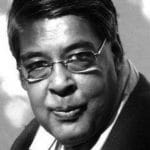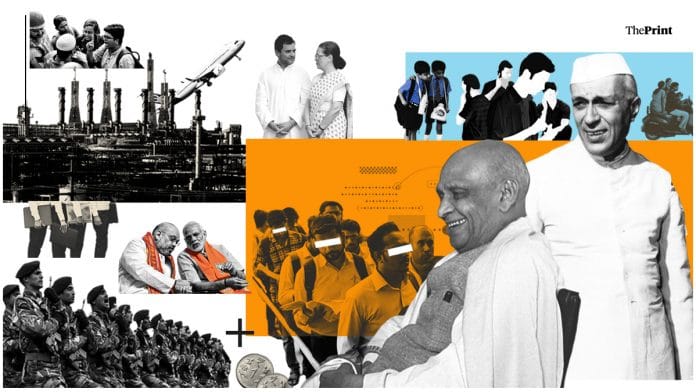External Affairs Minister S. Jaishankar has been bitterly attacked on Twitter after he cited Narayani Basu’s new book on V.P. Menon to claim that Jawaharlal Nehru did not want Vallabhbhai Patel in his cabinet in 1947. Historian Ramachandra Guha, Congress leader Jairam Ramesh published screenshots of letters written by Nehru to Mountbatten in 1947, and scholar Srinath Raghavan wrote an article to negate the claims.
ThePrint asks: Does the Jawaharlal Nehru-Sardar Patel ‘rivalry’ matter to India in 2020?
Nehru-Patel’s mutual admiration is well documented, but people want to imagine a post-truth history devoid of facts
 Purushottam Agrawal
Purushottam Agrawal
Professor and author
The supposed ‘rivalry’ between Jawaharlal Nehru and Sardar Vallabhbhai Patel does matter to those who neither have a sense of history nor a vision for the future.
Disagreements and rivalries are part of healthy debates and political processes. But it is amusing to see pygmies attempting to measure the giants. In order to hide their poverty of imagination of the future, such people imagine a sort of post-truth history with no regard for facts.
Nehru’s relations within Patel, and for that matter Mahatma Gandhi, Subhash Chandra Bose, Maulana Azad and C. Rajagopalachari were marked by mutual respect and courage to own up to political disagreements. There is no aspect of these disagreements that has remained a secret. Nehru and Patel’s mutual admiration has been documented and is easily available to the public, including External Affairs Minister S. Jaishankar.
However, the point is that no low is low enough and no lie is embarrassing enough if it can be used to denigrate Nehru. But, why is it so important for the Hindutva brigade to denigrate Nehru? The answer is that apart from him being modern, Nehru was also deeply steeped in Indian traditions and culture, by which he maintained an evergreen connect with people and cautioned them constantly against how disastrous communalism is for the country. The Hindutva camp cannot but pathetically hate Nehru.
Nehru-Patel ‘rivalry’ has a bearing on political score-settling in 2020. Otherwise, their time is over
 Prathama Banerjee
Prathama Banerjee
Professor, CSDS
The so-called Nehru-Patel ‘rivalry’ is relevant today only because it has a bearing on political score-settling. Otherwise, no one can dispute that Nehru’s and Patel’s time is over; the Congress they represented and today’s Congress are very different animals, as are today’s BJP and the Hindu Mahasabha and the RSS of earlier times. Much water has flown under the bridge since the 1940s and post-Mandir, Mandal and liberalisation eras — the rules of the political game have changed.
But then history itself is a burning political issue today, given that the BJP’s nationalism seeks to rewrite India’s history as Hindu history. For that reason, it is important to put historical facts right for the public record.
But there is a more interesting question lurking in the cracks of this recent controversy regarding the Nehru-Patel relationship. What is it about modern Indian politics that makes it necessary to think about leadership in terms of twinned figures, different but inseparable? So, Nehru and Patel, the modernist and the nationalist. Vajpayee and Advani, the secularist and the fundamentalist. Sonia Gandhi and Manmohan Singh, proponent of social rights and proponent of economic liberalisation. Modi and Shah, the mass leader and the strategist. Is there something similar in the Kejriwal and Sisodia twinning as well?
This is to say that both aspects need to be retained despite implicit opposition between them. So, never will a Nehru or a Modi suffice unto himself, but will always pull along the shadows of a Patel or a Shah.
Such trivia has no relevance today. Guha needlessly tried to politicise a minor academic observation
 Shankar Sharan
Shankar Sharan
Hindi columnist & professor of political science, NCERT
Ramachandra Guha tried to browbeat S. Jaishankar without refuting Narayani Basu’s finding about Nehru not wanting Patel in his first cabinet. As the matter stands, Basu’s assertion based on her reading of documents remains to be disproved.
Guha referred to Srinath Raghavan’s article, an opinion published in ThePrint Wednesday, which is not conclusive. Besides, it is a well-attested fact that Patel and Nehru did not see eye to eye on many issues. Moreover, each was superior to the other in different respects. In terms of popularity among all sections of Indians and having the special favour of Mahatma Gandhi, Nehru was ahead. But, in party organisation, political understanding and character, Patel was way above Nehru. Yet, the issue of ‘rivalry’ between them did not actually exist. Both were aware of their stature, and were perhaps indifferent about it too.
The most important thing, however, is that such decades-old trivia has no relevance today. Guha needlessly tried to politicise a minor academic observation. The politics and academics of India today have a whole lot of different pressing issues to be discussed, documented and settled. Especially in a bipartisan way. Bickering about such old and more or less decided trivia is not helpful to anyone. Our intellectuals should show some cool and imagination when it comes to making observations.
Nehru-Patel equation matters in 2020 because their contributions are central to Indian identity
 Dr Mujibur Rahman
Dr Mujibur Rahman
Faculty, Jamia Millia Islamia & editor, ‘Rise Of Saffron Power’
Yes, it does matter enormously. Nehru and Patel are the key architects of modern India whose contributions are central to the Indian identity. Their decisions taken in the 1940s and the 1950s continue to have tremendous consequences for the Indian democracy.
I was, in fact, present at the panel discussion where Karan Thapar, Verghese George, Shivshankar Menon and S. Jaishankar were speakers at the book launch of Narayani Basu’s VP Menon: The Unsung Architect of Modern India. I have a different interpretation of Jaishankar’s claims (based on Basu’s book) that Patel’s name did not figure in Nehru’s first list of Cabinet members. Patel’s name wasn’t the only one to be left out. Even B.R. Ambedkar and Maulana Azad weren’t included until Gandhi intervened. I am not sure about the exact list, but it was in the context of general discussions over Nehru ‘s choice of Cabinet members. Nehru did not have an ill-feeling for excluding Patel’s name. That said, Nehru did have fundamental differences with Patel on minority rights and economic development.
During the panel discussion, questions such as “What would happen if Patel was the first PM of India” were asked. I think we should also ask: “Had Nehru sided with Gandhi on Partition instead of siding with Patel, what would have happened to India’s independence”? Sardar Patel and Muhammad Ali Jinnah, both Gujaratis, desired to be India’s prime minister. But their ambitions were not respected by Mahatma Gandhi, another Gujarati, because he backed Nehru for the post.
For RSS-BJP, Patel and Nehru are empty vessels to be filled with notions of ‘wronged hero’ and ‘scheming villain’
 Apoorvanand
Apoorvanand
Professor, Delhi University
Sardar Vallabhbhai Patel is, in fact, an empty vessel in which the RSS and the BJP are filling their meaning. And so is the figure of Nehru. A story is being woven in which Patel is the wronged innocent hero and Nehru the scheming villain. Historical facts don’t matter here because these two leaders are as mythical as Ram who had to have a birthplace to be liberated by his people. It was the political force that ultimately turned even that into a legal reality.
So, it is futile to present facts because they are only for curious minds. When the minds of Hindus are so programmed that they want Akbar to be defeated at the hands of Rana Pratap, it is naive to expect that historians can win against politicians.
We make up facts according to our wishes. So, it is impossible to rescue Patel from the BJP that now has External Affairs Minister S. Jaishankar as its latest rabble-rouser. What is needed is a new political force that can replace the BJP. Unless that is done, academic matters will always be adjudicated by politicians.
Also read: What lessons should Narendra Modi, Amit Shah & Arvind Kejriwal draw from Delhi election?
By Pia Krishnankutty, journalist at ThePrint







Print space filler does not matter in 2020
I am too small a person to contradict these learned people whose opinion The Print has published. The issue is no longer whether Patel was greater leader than Nehru. Unfortunately, Nehruvian rule has left India such horde of problems that per force, one is compelled consider whether matters would have been different had Sardar Patel become the PM, instead of Nehru. Here is a list of problems directly attributable to Nehru:
1. Vascillating on safeguarding Kashmir, and stopping the progress of army when it was in the process of pushing back the raiders and pak army.
2. Not settling border dispupte with China and rejecting Zhou Enlai’s suggestion that India keep NEFA (Now arunachal pradesh), and give up claim to Axai Chin. Remember, Axai chin is at an average altitude of 17000 feet plus from Indian side, whereas, on china’s side, it is clearly accessible. By 1959, China had built roads.
3. Following forward policy with china, of setting up outposts beyond McMahon line in NEFA and on Axai Chin without logistical support.
4. Not taking IAF into confidence in the build up to conflict with China in 1962. Inadequate use of airforce lead to defeat.
5. Setting up mammoth PSU’s at Russia’s instance, which became white elephants.
6. Being blind to the folly and crookedness of people around him.
7 Not trusting his own army, but instead trusted British advisors who remained in India until 1950.
8. His socialism resulted in distribution of poverty instead of creating and distributing wealth.
India is still living with Kashmir problem, for not recovering the area occupied by the raiders in 1947-48. India is still intimidated by China with reminders of 1962 defeat.
The list is big. But this is enough. One wonder whether Nehru wanted India to progress at all?
The recent controversy on Patel’s exclusion from first cabinet of India and the two arguments made may be correct. At one stage Nehru may have thought of excluding Patel and that is what made Menon aghast and subsequently he might of thought of inducting Patel. Guha’s production of letter of invitation may be to assuse ruffled feeling of Patel as the news of his exclusion must of reached Patel through Meenon. Next question is whether Nehru has written such letters of invitation to all other to join his cabinet? Since Sekhar Guptha was so emphatic about archive material let he produce all such letters of invitation for all the members of the cabinet with same August 1, 1947 date. If no such letters are available then I will believe in Narayani’s version of Patel’s exclusion.
Today’s rulers have discovered more ways to divert attention of people from their failures & have shown Ingenuity in doing it unlike in the past.
It matters to those incompetent people at the helm; that could be test tube ” babies ” called Kauravas or Elephant headed God or imagined injustice to Patel at the hands of Nehru. Look at the state if economy & social harmony to know why irrelevant things are being repeatedly invoked besides blatant verbal attacks on Christians ( means Sonia Gandhi) & Moslems.
It matters to those incompetent people at the helm; that could be test tube ” babies ” called Kauravas or Elephant headed God or imagined injustice to Patel at the hands of Nehru. Look at the state if economy & social harmony to know why irrelevant things are being repeatedly invoked besides blatant verbal attacks on Christians ( means Sonia Gandhi) & Moslems.
?
Even in 2020 , Gandhi and Nehru seems to be the biggest obstacles in India’s progress in diplomatic and also in economic matters.
Non other than Apoorvanand mention RSS. Apoorvanand has extreme hatred for RSS. The views of such a hate filled person shouldn’t matter.
Wonder weather we have a External affairs Minister or a Past affairs Minister?